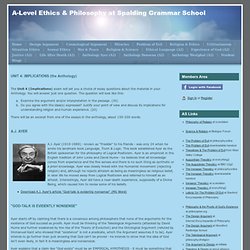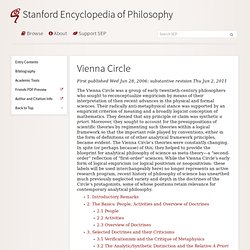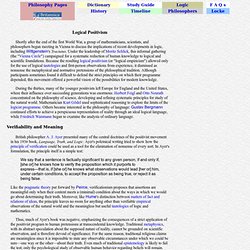

Anthology Ayer (A2) - A-Level Ethics & Philosophy at Spalding Grammar School. The Verification Principle, which was championed by A.J.

Ayer, is an incredibly powerful philosophical idea. It is a simple but devastating criticism of religious language and seems, in one fell swoop, to bring an end to the ongoing arguments between Theists and Sceptics. A.J. Ayer seems to think there is no more need for Theists to present new, improved versions of the Ontological Argument or the Design Argument and no more need for Atheists to poke holes in them.
Now that all God-talk has been shown to be "meaningless" or "nonsensical", philosophers can finally move on to more important matters. Logical positivism. Vienna Circle. First published Wed Jun 28, 2006; substantive revision Thu Jun 2, 2011 The Vienna Circle was a group of early twentieth-century philosophers who sought to reconceptualize empiricism by means of their interpretation of then recent advances in the physical and formal sciences.

Their radically anti-metaphysical stance was supported by an empiricist criterion of meaning and a broadly logicist conception of mathematics. They denied that any principle or claim was synthetic a priori. Moreover, they sought to account for the presuppositions of scientific theories by regimenting such theories within a logical framework so that the important role played by conventions, either in the form of definitions or of other analytical framework principles, became evident.
Logical Positivism. Logical Positivism Shortly after the end of the first World War, a group of mathematicians, scientists, and philosophers began meeting in Vienna to discuss the implications of recent developments in logic, including Wittgenstein's Tractatus.

Under the leadership of Moritz Schlick, this informal gathering (the "Vienna Circle") campaigned for a systematic reduction of human knowledge to logical and scientific foundations. Because the resulting logical positivism (or "logical empiricism") allowed only for the use of logical tautologies and first-person observations from experience, it dismissed as nonsense the metaphysical and normative pretensions of the philosophical tradition. Although participants sometimes found it difficult to defend the strict principles on which their programme depended, this movement offered a powerful vision of the possibilities for modern knowledge. Verifiability and Meaning. Logical Positivism. BBC Radio 4 - In Our Time, Logical Positivism.